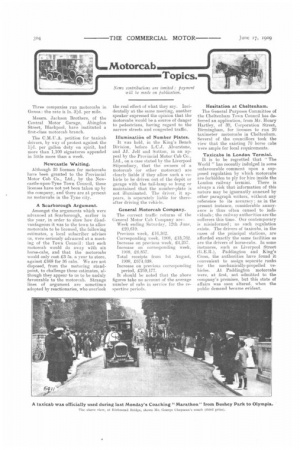News contribulions are invited ; payment will be made on tinblication.
Page 16

If you've noticed an error in this article please click here to report it so we can fix it.
Three companies run motoreabs in Genoa : the rate is Is. 3.1(1. per mile.
Messrs. Jackson Brothers, of the Central Motor Garage, Abingdon Street, Blackpool, have instituted a first-class motorcab branch.
The C.M.U.A. petition for taxicab drivers, by way of protest against the 1N. per gallon duty on spirit, had more than 1,100 signatures appended in little more than a week.
Newcastle Waiting.
Although 20 licenses for motorcabs have been granted to the Provincial Motor Cab Co., Ltd., by the Newcastle-upon-Tyne Town Council, these licenses have not yet been taken up by the company, and there are at present no motorcabs in the Tyne city.
A Scarborough Argument.
Amongst the arguments which were advanced at Scarborough, earlier in the year, in order to show how disadvantageous it was to the town to allow motorcabs to be licensed, the following estimates, a local subscriber advises us, were seriously advanced at a meeting of the Town Council: that each motorcab would do away with six horse-cabs, and that the motorcabs would only cost £3 5s. a year to store, against £468 for 36 cabs. We are not disposed, from the motoring standpoint, to challenge these estimates, although they appear to us to be unduly favourable to the motoreab. Strange lines of argument are sometimes adopted by reactionaries, who overlook the real effect of what they say. Incidentally at the same meeting, another speaker expressed the opinion that the motoreabs would be a source of danger to pedestrians, having regard to the narrow streets and congested traffic.
Illumination of Number Plates.
It was held, in the King's Bench Division, before L.C.J. Alverstone, and JJ. Jelf and Sutton, in an appeal by the Provincial Motor Cab Co., Ltd., on a case stated by the Liverpool Stipendiary, that the owners of a motoreab (or other motorcar) are clearly liable if they allow such a vehicle to be driven out of the dep4t or garage with the tail-lamp so hung or maintained that the number-plate is not illuminated. The driver, it appears, is separately liable for thereafter driving the vehiele.
General Motorcab Company. The current traffic returns of the General Motor Cab Company are: Week ending Saturday, 12th June, £20,619.
Previous week, £16,362.
Corresponding week, 1908, £13,762. Increase on previous week, £4,257. Increase on corresponding week, 1908, £6,857.
Total receipts from 1st August, 1908, £674,038.
Increase on previous corresponding period, £259,177. It should be noted that the above figures take no account of the average number of cabs in service for the respective periods. Hesitation at Cheltenham.
The General Purposes Committee of the Cheltenham Town Council has deferred an application, from Mr. Henry Hartley, of 39, Corporation Street, Birmingham, for licenses to run 20 taximeter motorcabs in Cheltenham. Several of the councillors took the view that the existing 70 horse cabs were ample for local requirements.
Taxicabs in London Termini.
It is to be regretted that " The World " has recently indulged in some unfavourable comment upon a supposed regulation by which motorcabs are forbidden to ply for hire inside the London railway termini. There is always a risk that information of this nature may be ignorantly annexed by other paragraph writers, without any reference to its accuracy; as in the present instance, considerable annoyance is thus often caused to individuals; the railway authorities are the sufferers this time. Our contemporary is misinformed; no such regulation exists. The drivers of taxicabs, in the cases of the principal stations, are afforded exactly the same facilities as are the drivers of horse-cabs. In some instances, such as Liverpool Street (G.E.R.), Paddington and King's Cross, the authorities have found it convenient to assign separate ranks for the mechanically-propelled vehicles. At Paddington motorcabs were, at first, not admitted to the company's premises, but this state of affairs was soon altered, when the public demand became evident.
























